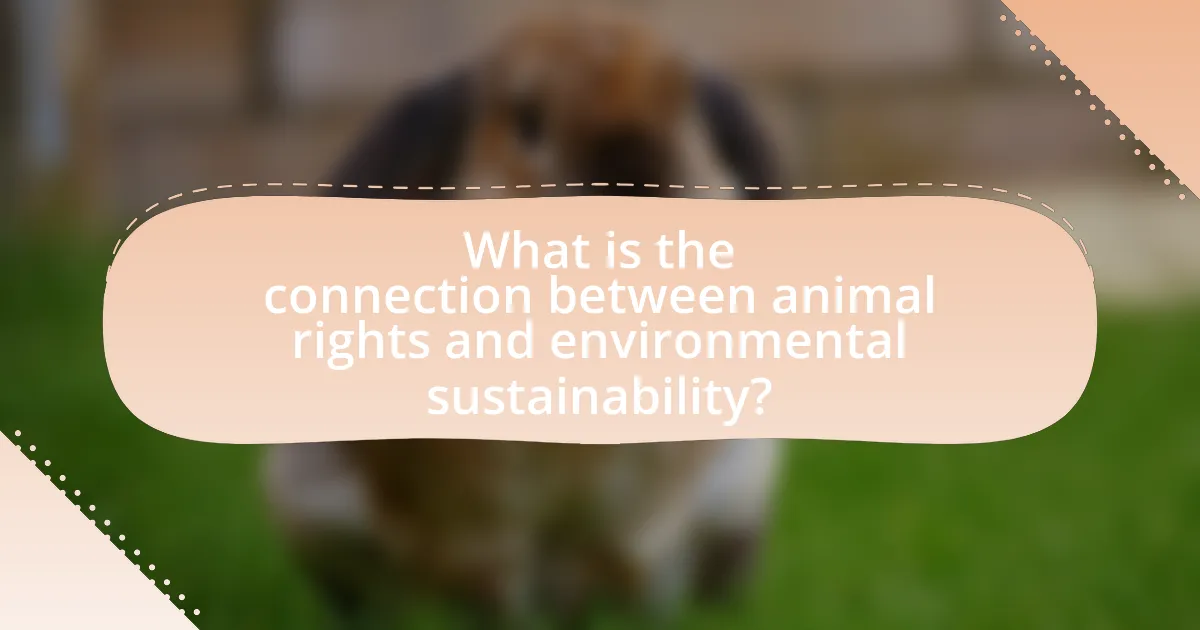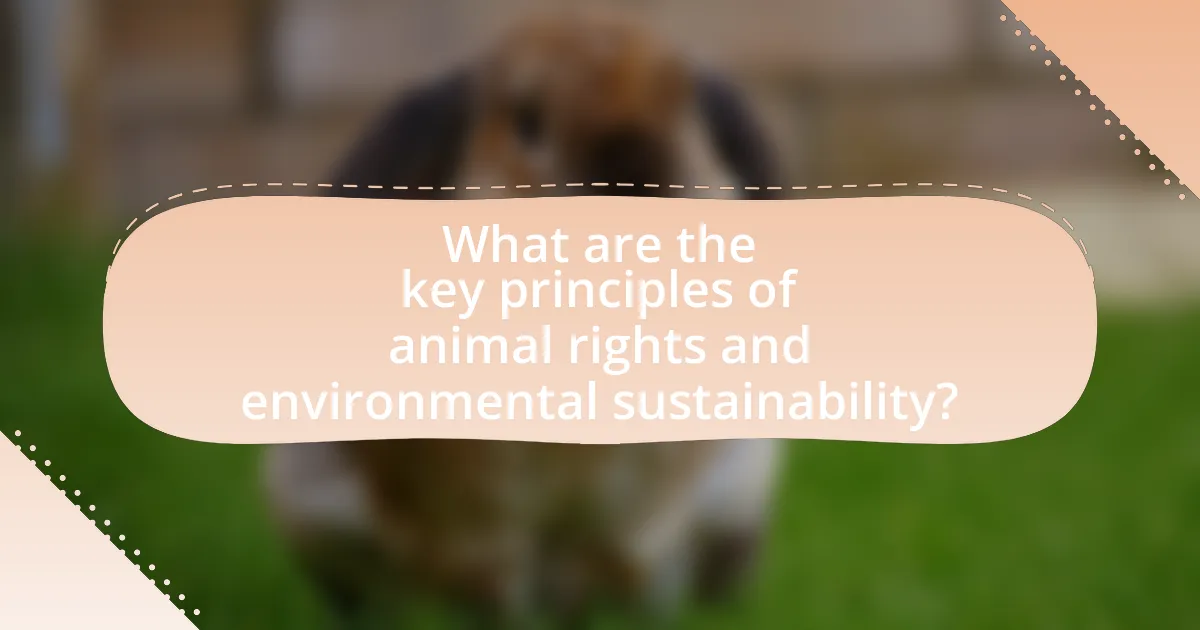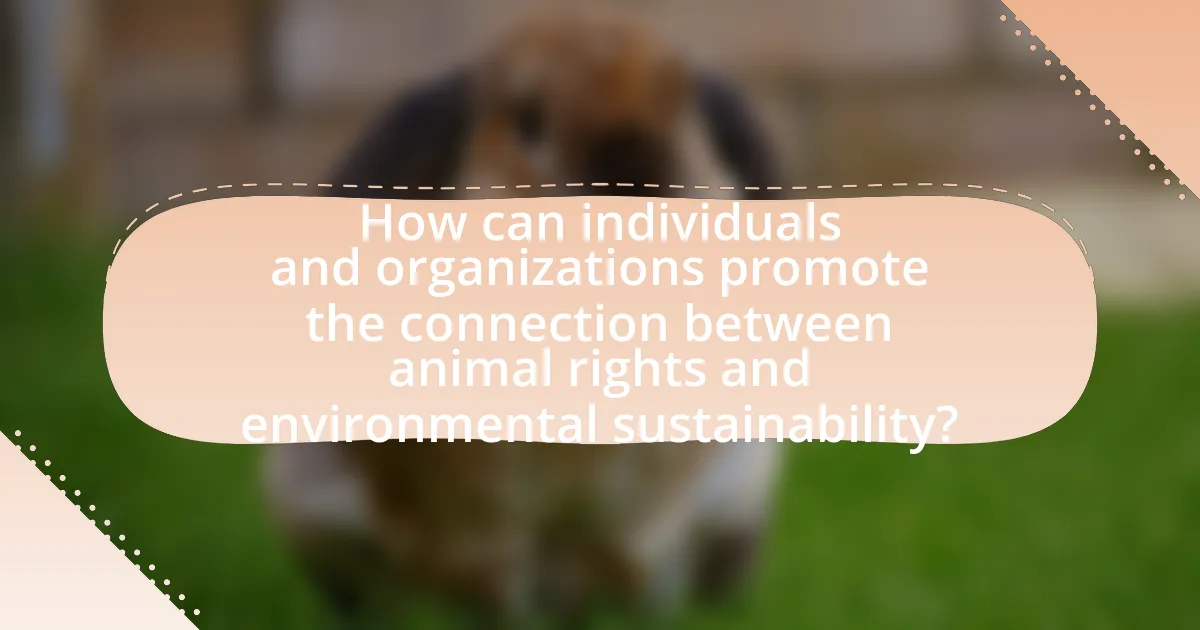The article explores the connection between animal rights and environmental sustainability, emphasizing the ethical treatment of animals and the significant impact of animal agriculture on ecosystems. It highlights how prioritizing animal rights can lead to sustainable practices that mitigate climate change, reduce greenhouse gas emissions, and protect biodiversity. Key discussions include the ethical considerations surrounding animal welfare, the role of animals in maintaining ecosystem health, and the benefits of plant-based diets and ethical farming practices. The article also outlines practical steps for integrating animal rights into sustainability efforts and showcases successful initiatives that bridge these two critical areas.

What is the connection between animal rights and environmental sustainability?
Animal rights and environmental sustainability are interconnected through the ethical treatment of animals and the impact of animal agriculture on ecosystems. The exploitation of animals for food, clothing, and entertainment contributes significantly to environmental degradation, including deforestation, greenhouse gas emissions, and biodiversity loss. For instance, the Food and Agriculture Organization (FAO) reports that livestock production is responsible for approximately 14.5% of global greenhouse gas emissions. By advocating for animal rights, which promotes humane treatment and reduced reliance on animal agriculture, we can foster more sustainable practices that protect ecosystems and mitigate climate change. This connection highlights the importance of ethical considerations in environmental policies and practices.
How do animal rights impact environmental sustainability?
Animal rights significantly impact environmental sustainability by promoting practices that reduce harm to ecosystems and biodiversity. When animal rights are prioritized, there is often a shift towards plant-based diets and sustainable farming practices, which can lower greenhouse gas emissions and reduce land degradation. For instance, the livestock sector is responsible for approximately 14.5% of global greenhouse gas emissions, according to the Food and Agriculture Organization. By advocating for animal welfare, movements encourage reduced meat consumption, leading to less deforestation and habitat destruction. This connection illustrates that respecting animal rights can align with and enhance efforts toward a more sustainable environment.
What are the ethical considerations surrounding animal rights in environmental contexts?
The ethical considerations surrounding animal rights in environmental contexts include the recognition of sentient beings’ intrinsic value and the impact of human activities on biodiversity. Ethical frameworks, such as utilitarianism and rights-based approaches, argue that animals possess interests that should be respected, particularly in the face of habitat destruction and climate change. For instance, the extinction of species due to deforestation not only harms animal populations but also disrupts ecosystems, which are vital for human survival. Research indicates that protecting animal rights can lead to more sustainable environmental practices, as seen in studies highlighting the benefits of biodiversity for ecosystem resilience. Therefore, integrating animal rights into environmental policies is essential for promoting both ethical treatment of animals and sustainable ecological health.
How does the treatment of animals influence ecosystem health?
The treatment of animals significantly influences ecosystem health by affecting biodiversity and ecological balance. Healthy animal populations contribute to the stability of ecosystems through roles such as pollination, seed dispersal, and maintaining food webs. For instance, the decline of apex predators, like wolves, can lead to overpopulation of herbivores, which in turn can result in overgrazing and habitat degradation. Research published in the journal “Ecology Letters” by Ripple and Beschta (2012) highlights how the reintroduction of wolves in Yellowstone National Park restored balance to the ecosystem, demonstrating the critical role animals play in maintaining ecological integrity. Thus, ethical treatment of animals is essential for sustaining healthy ecosystems.
Why is it important to consider animal rights in sustainability efforts?
Considering animal rights in sustainability efforts is crucial because the treatment of animals directly impacts ecological balance and biodiversity. Ethical treatment of animals promotes healthier ecosystems, as animal welfare is linked to the health of the environment; for instance, factory farming contributes to deforestation, greenhouse gas emissions, and water pollution. Research indicates that sustainable agricultural practices that respect animal rights can lead to improved soil health and reduced carbon footprints, thereby enhancing overall environmental sustainability.
What role do animals play in maintaining biodiversity?
Animals play a crucial role in maintaining biodiversity by contributing to ecosystem balance and health. They participate in various ecological processes such as pollination, seed dispersal, and nutrient cycling, which are essential for the survival of diverse plant and animal species. For instance, bees and other pollinators are responsible for the reproduction of approximately 75% of flowering plants, which in turn support a wide range of wildlife. Additionally, large herbivores like elephants help maintain savanna ecosystems by controlling vegetation growth, allowing for a variety of species to thrive. The loss of animal species can lead to ecosystem degradation, reduced resilience to environmental changes, and ultimately a decline in biodiversity.
How can protecting animal rights contribute to climate change mitigation?
Protecting animal rights can significantly contribute to climate change mitigation by promoting sustainable agricultural practices and reducing greenhouse gas emissions. Livestock farming is a major source of methane and nitrous oxide, potent greenhouse gases that contribute to global warming. By advocating for animal rights, there is a push towards plant-based diets and alternatives to animal agriculture, which can lower these emissions. For instance, a study published in the journal “Nature” found that shifting to plant-based diets could reduce food-related greenhouse gas emissions by up to 70% by 2050. Additionally, protecting wildlife habitats and ecosystems helps maintain biodiversity, which is crucial for resilience against climate change impacts. Thus, the intersection of animal rights and environmental sustainability plays a vital role in addressing climate change.

What are the key principles of animal rights and environmental sustainability?
The key principles of animal rights include the belief that animals have inherent value and deserve to live free from exploitation and suffering, while environmental sustainability emphasizes the need to protect ecosystems and natural resources for future generations. Animal rights advocates argue that sentient beings should not be subjected to harm for human benefit, as evidenced by the growing body of research indicating that animals experience pain and emotions similarly to humans. Environmental sustainability is supported by principles such as reducing waste, conserving biodiversity, and promoting renewable resources, which are essential for maintaining ecological balance. The interconnection between these principles is highlighted by studies showing that animal agriculture significantly contributes to environmental degradation, including deforestation and greenhouse gas emissions, thus reinforcing the need for ethical treatment of animals as part of sustainable practices.
What are the foundational beliefs of the animal rights movement?
The foundational beliefs of the animal rights movement center around the idea that non-human animals possess inherent rights similar to human rights, advocating for their protection from exploitation and harm. This movement asserts that animals are sentient beings capable of experiencing pain and suffering, which necessitates ethical consideration and respect for their welfare. Additionally, proponents argue against practices such as factory farming, animal testing, and entertainment industries that exploit animals, emphasizing the moral obligation to treat all living beings with compassion and dignity. The movement is supported by various ethical frameworks, including utilitarianism and rights-based theories, which highlight the importance of minimizing suffering and recognizing the intrinsic value of animal life.
How do these beliefs align with environmental sustainability goals?
Beliefs in animal rights align with environmental sustainability goals by promoting the protection of ecosystems and biodiversity. Advocates for animal rights often emphasize the ethical treatment of all living beings, which inherently supports the preservation of habitats and the reduction of practices that harm wildlife, such as deforestation and pollution. For instance, the animal agriculture industry is a significant contributor to greenhouse gas emissions, deforestation, and water depletion; thus, reducing meat consumption aligns with sustainability efforts aimed at mitigating climate change and conserving resources. Studies show that plant-based diets can lower carbon footprints significantly, reinforcing the connection between animal rights beliefs and environmental sustainability objectives.
What are the main arguments for animal rights in the context of environmental ethics?
The main arguments for animal rights in the context of environmental ethics include the intrinsic value of non-human life, the interconnectedness of ecosystems, and the moral obligation to prevent suffering. Advocates assert that animals possess inherent worth, which necessitates their protection from exploitation and harm. This perspective aligns with the understanding that ecosystems are complex networks where the well-being of animals contributes to environmental health. For instance, the decline of certain animal populations can disrupt food chains and lead to biodiversity loss, as evidenced by studies showing that the extinction of keystone species can have cascading effects on entire ecosystems. Furthermore, ethical frameworks, such as utilitarianism, argue that reducing animal suffering is essential for achieving overall environmental sustainability, as humane treatment of animals fosters healthier ecosystems and promotes a more balanced relationship between humans and nature.
What sustainable practices support both animal rights and environmental health?
Sustainable practices that support both animal rights and environmental health include plant-based diets, regenerative agriculture, and wildlife conservation efforts. Plant-based diets reduce the demand for animal agriculture, which is a significant contributor to greenhouse gas emissions, deforestation, and habitat destruction. Research indicates that shifting to a plant-based diet can lower an individual’s carbon footprint by up to 50%. Regenerative agriculture practices, such as crop rotation and agroforestry, enhance soil health and biodiversity while promoting animal welfare by allowing for more humane treatment of livestock. Additionally, wildlife conservation efforts protect natural habitats and ecosystems, ensuring that animal species can thrive without the pressures of habitat loss and pollution. These practices collectively contribute to a healthier planet and promote the ethical treatment of animals.
How does plant-based agriculture benefit animal welfare and the environment?
Plant-based agriculture significantly benefits animal welfare and the environment by reducing the need for animal farming, which is associated with high levels of animal suffering and environmental degradation. By shifting to plant-based systems, fewer animals are raised for food, leading to decreased instances of confinement, stress, and inhumane treatment often found in industrial farming practices.
Moreover, plant-based agriculture contributes to environmental sustainability by lowering greenhouse gas emissions, as livestock production is responsible for approximately 14.5% of global emissions according to the Food and Agriculture Organization. Additionally, it requires less land and water compared to animal agriculture; for instance, producing one kilogram of beef requires about 15,000 liters of water, while producing one kilogram of vegetables typically requires significantly less. This shift not only promotes animal welfare but also aids in conserving natural resources and reducing habitat destruction.
What are the benefits of ethical farming practices for ecosystems?
Ethical farming practices benefit ecosystems by promoting biodiversity, enhancing soil health, and reducing pollution. These practices, such as crop rotation, organic farming, and integrated pest management, support a diverse range of species, which contributes to ecosystem resilience. For instance, organic farming methods have been shown to increase species richness by 30% compared to conventional farming, as reported in a study published in the journal “Nature” by Benis et al. (2017). Additionally, ethical farming reduces chemical runoff into waterways, thereby protecting aquatic ecosystems and improving water quality. This holistic approach not only sustains agricultural productivity but also fosters a healthier environment, demonstrating the interconnectedness of ethical farming and ecosystem health.

How can individuals and organizations promote the connection between animal rights and environmental sustainability?
Individuals and organizations can promote the connection between animal rights and environmental sustainability by advocating for plant-based diets and ethical treatment of animals, which significantly reduces environmental degradation. Research indicates that animal agriculture is responsible for approximately 14.5% of global greenhouse gas emissions, highlighting the environmental impact of livestock farming. By supporting policies that protect animal welfare and promote sustainable agricultural practices, such as regenerative farming, stakeholders can create a synergistic relationship between animal rights and environmental health. Additionally, educational campaigns that raise awareness about the ecological benefits of reducing meat consumption can further strengthen this connection, as studies show that plant-based diets require fewer natural resources and lead to lower carbon footprints.
What actions can individuals take to support both causes?
Individuals can support both animal rights and environmental sustainability by adopting a plant-based diet. Research indicates that plant-based diets significantly reduce greenhouse gas emissions, with studies showing that animal agriculture is responsible for approximately 14.5% of global emissions. Additionally, individuals can advocate for policies that protect wildlife habitats and promote sustainable farming practices, as these actions help preserve ecosystems and animal welfare. Engaging in community initiatives, such as tree planting or wildlife conservation efforts, further reinforces the connection between protecting animals and the environment.
How can consumer choices influence animal rights and sustainability?
Consumer choices significantly influence animal rights and sustainability by determining demand for products that either support or harm animal welfare and the environment. When consumers opt for cruelty-free, plant-based, or sustainably sourced products, they drive companies to adopt ethical practices, thereby promoting animal rights. For instance, a 2020 study published in the journal “Sustainability” found that increased consumer demand for plant-based diets can lead to reduced greenhouse gas emissions and lower animal exploitation rates. Conversely, choosing products linked to factory farming perpetuates animal suffering and environmental degradation. Thus, informed consumer decisions can create a positive feedback loop that enhances both animal rights and sustainability.
What role does education play in promoting awareness of these issues?
Education plays a crucial role in promoting awareness of the connection between animal rights and environmental sustainability. Through structured curricula, educational institutions can inform students about the ethical implications of animal treatment and the environmental impact of animal agriculture. For instance, studies have shown that educational programs focusing on sustainability and animal welfare lead to increased awareness and behavioral changes among students, as evidenced by a 2019 study published in the Journal of Environmental Education, which found that students exposed to such topics were more likely to adopt sustainable practices. This demonstrates that education not only raises awareness but also fosters a sense of responsibility towards both animal rights and environmental conservation.
What initiatives exist that bridge animal rights and environmental sustainability?
Initiatives that bridge animal rights and environmental sustainability include plant-based diet campaigns, wildlife conservation programs, and sustainable farming practices. Plant-based diet campaigns, such as Meatless Monday, promote reduced meat consumption to lower greenhouse gas emissions and animal suffering. Wildlife conservation programs, like the World Wildlife Fund’s efforts, aim to protect endangered species while promoting biodiversity, which is crucial for ecosystem health. Sustainable farming practices, including regenerative agriculture, focus on animal welfare and environmental health by minimizing chemical use and enhancing soil quality. These initiatives demonstrate the interconnectedness of animal rights and environmental sustainability, as they address both ethical treatment of animals and the need for ecological balance.
How do non-profit organizations advocate for these interconnected issues?
Non-profit organizations advocate for interconnected issues of animal rights and environmental sustainability through awareness campaigns, policy advocacy, and community engagement. These organizations often conduct research to highlight the impact of animal agriculture on climate change, biodiversity loss, and habitat destruction, providing evidence-based arguments to influence public opinion and legislative action. For instance, the World Wildlife Fund (WWF) emphasizes the link between animal welfare and ecosystem health, advocating for sustainable farming practices that protect both animals and the environment. By collaborating with other stakeholders, such as governments and businesses, non-profits work to create comprehensive strategies that address these interconnected challenges effectively.
What are some successful case studies of integrated approaches?
Successful case studies of integrated approaches include the “One Health” initiative, which connects human, animal, and environmental health to address zoonotic diseases and promote sustainable practices. This approach has been validated through the successful management of rabies in Africa, where vaccination campaigns for dogs significantly reduced human cases, demonstrating the interconnectedness of animal welfare and public health. Another example is the “Agroecology” movement, which promotes sustainable farming practices that respect animal rights while enhancing biodiversity and soil health. Research shows that agroecological practices can increase crop yields by 20-50% while reducing chemical inputs, thus benefiting both animal welfare and environmental sustainability.
What are practical steps for integrating animal rights into sustainability practices?
Practical steps for integrating animal rights into sustainability practices include adopting plant-based diets, promoting humane farming methods, and implementing policies that protect animal habitats. Adopting plant-based diets reduces demand for animal agriculture, which is a significant contributor to greenhouse gas emissions, deforestation, and water use. Promoting humane farming methods, such as pasture-based systems, ensures better living conditions for animals while also supporting biodiversity. Implementing policies that protect animal habitats, like creating wildlife corridors and preserving natural ecosystems, helps maintain biodiversity and supports the overall health of the environment. These steps are supported by research indicating that animal agriculture is responsible for approximately 14.5% of global greenhouse gas emissions, highlighting the need for sustainable practices that consider animal welfare.